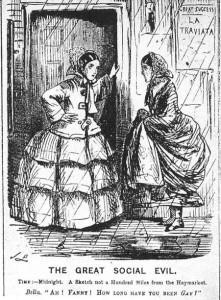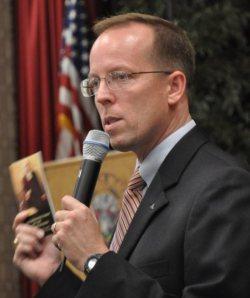This essay first appeared in Cliterati on March 9th; I have modified it slightly to fit the format of this blog.
 For most of the Twentieth Century, “authorities” in many Western countries (especially the United States) chose to portray sex workers as either criminals to be jailed or “problems” to be solved, “social evils” as the Victorians had termed us. But by the 1970s, that narrative was wearing thin: the sexual revolution had opened many people’s eyes to the fact that sex is not some magical polluting force, and early feminists campaigned for sex workers’ rights. Though mainstream feminism went anti-sex in the ‘80s, the legacies of the civil rights movement, the gay rights movement and the sexual revolution had by then undermined the official narrative; the portrayal of sex workers in movies and TV shows had become much more positive, and the average person was beginning to see anti-harlot crusades for what they are: authoritarian interference in people’s private lives. Clearly, that couldn’t be allowed to continue; something had to be done, so prohibitionists…
For most of the Twentieth Century, “authorities” in many Western countries (especially the United States) chose to portray sex workers as either criminals to be jailed or “problems” to be solved, “social evils” as the Victorians had termed us. But by the 1970s, that narrative was wearing thin: the sexual revolution had opened many people’s eyes to the fact that sex is not some magical polluting force, and early feminists campaigned for sex workers’ rights. Though mainstream feminism went anti-sex in the ‘80s, the legacies of the civil rights movement, the gay rights movement and the sexual revolution had by then undermined the official narrative; the portrayal of sex workers in movies and TV shows had become much more positive, and the average person was beginning to see anti-harlot crusades for what they are: authoritarian interference in people’s private lives. Clearly, that couldn’t be allowed to continue; something had to be done, so prohibitionists…
…created the “sex trafficking” hysteria as a means of rallying the public behind criminalization again. As the “Nation Strategy” of Swanee Hunt’s Demand Abolition organization states, “Framing the Campaign’s key target as sexual slavery might garner more support and less resistance, while framing the Campaign as combating prostitution may be less likely to mobilize similar levels of support and to stimulate stronger opposition.” In other words, “since people now recognize it’s wrong for the government to stick its nose into private bedrooms, we have to pretend this is really about something else.”
Nowadays, it’s rare to hear old-style police talk about locking up the dirty whores to protect the public from them; far more often, armed raids in which women are terrorized, handcuffed, evicted in freezing weather, humiliated, caged, gang-raped or otherwise brutalized are described as “rescues”. “Sex trafficking” does far more than let cops rebrand their usual sadism as heroism, however; it also produces more practical results, such as immigration control:
Specialist anti-slavery teams are to be based inside UK airports in a bid to clamp down on human trafficking…The first team will be based at Heathrow from 1 April before the scheme is rolled out to other airports. They will be tasked with identifying victims and disrupting criminal gangs involved in international trafficking. The government says the scheme will ensure there is “no easy route into the UK for traffickers”…
“The scheme is part of a larger plan to ensure there is no easy route into the UK”. There, fixed it for you. But pandering to xenophobia is only one way in which “sex trafficking” hysteria is useful to politicians:
[Maine state] Rep. Amy Volk…would give courts permission to vacate prostitution convictions against people who [can prove they] were forced or coerced into the crime. [Her] bill…also would set up a compensation fund for victims, paid for with increased fines for those who are convicted of promoting prostitution. It also would make the crime of furnishing drugs to a prostitute an aggravated offense…Ben Grant, chairman of the Maine Democratic Party, accused Volk, a pro-life legislator, of trying to “soften her edges” on women’s issues by sponsoring the bill…
 This is, of course, a nonsensical accusation; a bill which infantilizes women (compare “furnishing drugs to a prostitute” with “furnishing alcohol to a minor”) would hardly seem out of character for an anti-abortion politician, and the “sex trafficking” hysteria is so thoroughly grounded in Protestant Christian morality that the politician Linda Smith, founder of Shared Hope International, once described “anti-trafficking” activism as “an extension of the ‘pro-life’ cause”. Yet the most important advantage of the hysteria to governments is only hinted at in the article above; it is spelled out clearly in the one below:
This is, of course, a nonsensical accusation; a bill which infantilizes women (compare “furnishing drugs to a prostitute” with “furnishing alcohol to a minor”) would hardly seem out of character for an anti-abortion politician, and the “sex trafficking” hysteria is so thoroughly grounded in Protestant Christian morality that the politician Linda Smith, founder of Shared Hope International, once described “anti-trafficking” activism as “an extension of the ‘pro-life’ cause”. Yet the most important advantage of the hysteria to governments is only hinted at in the article above; it is spelled out clearly in the one below:
Recently the Virginia House of Delegates passed two bills ostensibly aimed at…human trafficking…HB 235 forces people convicted of soliciting an underage prostitute to register as sex offenders. HB 660 enables prosecutors to seize the earnings of sex workers. The bills were submitted by…Rob Bell…who in 2012 voted in favor of a bill requiring all women to undergo a transvaginal ultrasound prior to having an abortion. In the same session, he was the primary sponsor of a bill…requiring police to inquire into the citizenship of anyone arrested, regardless of criminal charges…[So-called] abolitionists want to eliminate sex work through more punitive legislation. Generally motivated by moral opposition to sex work, they have moved into using outrage and concern over human trafficking to push for harsher laws aimed at punishing sex workers. HB 660 is exactly this sort of bill. It allows police to take possession of these women’s property, including cash and vehicles, upon their arrest. The women don’t even need to be convicted…incentivizing cops to arrest more grown women by allowing them to seize their earnings will do nothing but line the pockets of police department at the expense of an already-vulnerable population…
All three strands come together in the person of Rob Bell: the fundamentalist Christian crusade to control women’s bodies, a xenophobic anti-immigrant agenda and an opportunity to fill the state’s coffers by legalized theft. Official narratives pretend that government actors want to “help” sex workers, but in reality the only people these “authorities” are “helping” is themselves.
